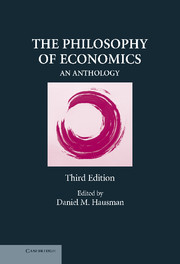Book contents
- Frontmatter
- Contents
- Introduction
- PART ONE CLASSIC DISCUSSIONS
- 1 On the Definition and Method of Political Economy
- 2 Objectivity and Understanding in Economics
- 3 The Nature and Significance of Economic Science
- 4 Economics and Human Action
- 5 Selected Texts on Economics, History, and Social Science
- 6 The Limitations of Marginal Utility
- PART TWO POSITIVIST AND POPPERIAN VIEWS
- PART THREE IDEOLOGY AND NORMATIVE ECONOMICS
- PART FOUR BRANCHES AND SCHOOLS OF ECONOMICS AND THEIR METHODOLOGICAL PROBLEMS
- PART FIVE NEW DIRECTIONS IN ECONOMIC METHODOLOGY
- Selected Bibliography of Books on Economic Methodology
- Index
3 - The Nature and Significance of Economic Science
Published online by Cambridge University Press: 05 June 2012
- Frontmatter
- Contents
- Introduction
- PART ONE CLASSIC DISCUSSIONS
- 1 On the Definition and Method of Political Economy
- 2 Objectivity and Understanding in Economics
- 3 The Nature and Significance of Economic Science
- 4 Economics and Human Action
- 5 Selected Texts on Economics, History, and Social Science
- 6 The Limitations of Marginal Utility
- PART TWO POSITIVIST AND POPPERIAN VIEWS
- PART THREE IDEOLOGY AND NORMATIVE ECONOMICS
- PART FOUR BRANCHES AND SCHOOLS OF ECONOMICS AND THEIR METHODOLOGICAL PROBLEMS
- PART FIVE NEW DIRECTIONS IN ECONOMIC METHODOLOGY
- Selected Bibliography of Books on Economic Methodology
- Index
Summary
Lionel Robbins (1898–1984) was educated at University College, London, and at the London School of Economics. He taught at the London School of Economics, New College, Oxford, and at the University of London. The author of many books on economics and on economic policy, Robbins was made a life peer in 1959. His An Essay on the Nature and Significance of Economic Science, from which excerpts are reprinted here, was immediately recognized as a classic and has been very influential.
Chapter I: The Subject Matter of Economics
… 3. But where, then, are we to turn? The position is by no means hopeless. Our critical examination of the “materialist” definition has brought us to a point from which it is possible to proceed forthwith to formulate a definition which shall be immune from all these strictures.
Let us turn back to the simplest case in which we found this definition inappropriate – the case of isolated man dividing his time between the production of real income and the enjoyment of leisure. We have just seen that such a division may legitimately be said to have an economic aspect. Wherein does this aspect consist?
The answer is to be found in the formulation of the exact conditions which make such division necessary. They are four. In the first place, isolated man wants both real income and leisure. Secondly, he has not enough of either fully to satisfy his want of each.
- Type
- Chapter
- Information
- The Philosophy of EconomicsAn Anthology, pp. 73 - 99Publisher: Cambridge University PressPrint publication year: 2007
- 12
- Cited by



